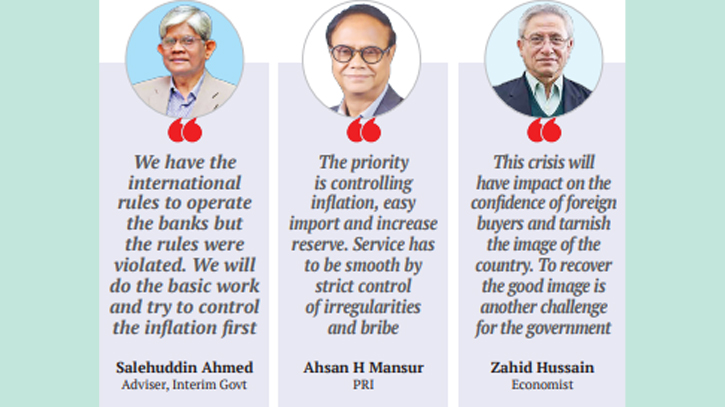
Photo: Messenger
After a month-long, bloody student-led movement, the interim government has taken control of the country, now facing significant economic challenges, including managing inflation and establishing governance within the banking sector.
Meanwhile, various components of the economy have ground to a halt due to the violence, internet blackouts, and curfews that arose from the quota reform movement, as well as the 15-day clashes and killings. Since mid-2022, the country’s economy has been grappling with hardships, particularly with inflation and a dollar crisis exacerbated by the Russia-Ukraine war. Additionally, the economy is under increasing pressure to repay foreign loans.
Dr Salehuddin Ahmed, the interim government's adviser of Finance and Planning told the Daily Messenger “It takes time to activate the economy smoothly. We have to find out the problems. As we will not stay for long, so we have to be proactive not reactive. We have to establish trust in central bank.”
He said “We want to establish an equality-based economy. An easy life and livelihood are the main goal of us.”
He added, “We have the international rules to operate the banks but the rules were violated. We will do the basic work and try to control the inflation first.”
Renowned economist and director of Policy Research Institute of Bangladesh Ahsan H Mansur said “The interim government has to work in smooth service provide, macro economic and in structural reformation. The priority is controlling inflation, easy import and increase reserve. Service has to be smooth by strict control of irregularities and bribe.”
Regarding the tenure of the interim government, he said “We will watch them 100 days. Then they have to place a roadmap how they want to reform the economy then we will see how many years they will stay in power.”
However, he believes that the overall reform of the country will require at least three to five years, and the people must be patient and allow the government that time.
Sources said that the impact of the recent widespread destruction and internet shutdowns is more severe than the consequences of previous crises the country has faced. According to one estimate, Bangladesh's economy lost approximately one billion dollars per day during those tumultuous days.
Only garment sector lost Tk 16,00 crore daily in violence and the power sector lost Tk 1,000 crore which will require more than Tk 1,000 crore to repair. Already, the garment exporters have experienced losses for freight cost to deliver the consignment.
Ahsan H. Mansur said “Bangladesh has lost about one billion dollars per day in the last few days. This is a great loss for Bangladesh. Because Bangladesh is already in economic uncertainty.”
However, business and industrial activities have resumed since Wednesday. Bangladesh’s economy is facing its toughest challenge in decades due to high inflation, declining exports and dollar crisis. At that moment, garment factories and shops were shut down due to the violence. All port operations were stopped. To control the situation, the government cut off internet connection across the country along with imposition of curfew.
Economist Zahid Hussain said this crisis will have impact on the confidence of foreign buyers and tarnish the image of the country. To recover the good image is another challenge for the government.
According to Bangladesh Bank, Bangladesh's annual inflation stood at 9.73 percent in the 2023-24 fiscal year, the highest in 12 years and higher than the government's 7.5 percent.
Despite the recent increase in loan interest rates within the banking sector, inflation remains close to 10 per cent, and revenue collection targets are still far from being met. Experts suggest that the interim government is likely to face a significant financial crisis as a result. How the new administration plans to navigate this challenge remains to be seen.
Ruhul Amin Sikder, Secretary General of Bangladesh Inland Container Depots Association (BICDA), told the Daily Messenger “We have incurred huge loss during the days. It will take time to recover the loss. I fear the situation will not normal within a week.”
Despite this depression, garment factories resumed production. But the challenge of the moment for the exporters is to deliver the consignment within due time. The good news is that after the operation of the ports, the speed of import and export container shipment has increased. Business activities have started as broadband internet connectivity resumes. Moreover, the exporters started communicate with the buyers.
Muhammad Hatem, Executive President of Bangladesh Knitwear Manufacturers and Exporters Association (BKMEA) is concern about availability of raw material as the transportation system was completely lost. He said “Due to the disruption of the supply system, the factories are facing a shortage of raw materials.”
Messenger/Disha








